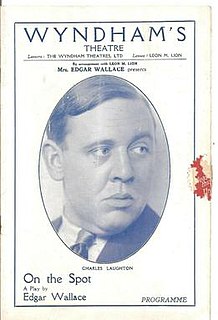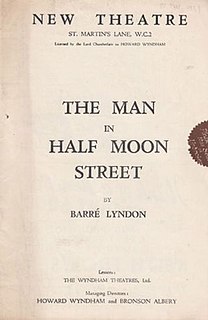
On the Spot is a 1930 Chicago-set play by the British writer Edgar Wallace. Wallace was inspired by a visit to the United States and, in particular, the Saint Valentine's Day Massacre. Known as a prolific author, he reportedly dictated the manuscript for the play in just four days. It was his greatest theatrical success.
The Old Man is a 1931 mystery play by the British writer Edgar Wallace. Its original production was staged at Wyndham's Theatre in London's West End for a ninety performance run. It is set entirely in the "Coat of Arms" tavern where a mysterious old man lurks in the background, reputedly an escapee from a lunatic asylum. The original cast included Alfred Drayton, Jack Melford, Harold Warrender and Finlay Currie.
The Terror is a 1927 mystery thriller play by the British writer Edgar Wallace. It is based on Wallace's 1926 novel The Black Abbot.
The Outsider is a play by the British writer Dorothy Brandon. It portrays the struggle of an unorthodox medical practitioner to gain acceptance by the medical establishment. It was subsequently revised to show the unconventional triumphing over the conventional, whereas the play had originally had the opposite ending.
Dorothy Brandon was a British playwright active in the interwar years. Her greatest West End success was the 1923 medical drama The Outsider which was revived several times, and adapted into films on three occasions.
After Dark is a thriller play by the British writer Joseph Jefferson Farjeon.
Mumsie or Mumsée is a 1920 play by the Anglo-American writer Edward Knoblock.
Norman Ginsbury (1902–1991) was a British writer, known for his plays. He also wrote material for film and television.

Diversion is a 1927 play by the British writer John Van Druten. It was first staged in the United States at the Lyceum Theatre in Rochester before beginning a 68 run performance at the 49th Street Theatre in 1928. In London it ran for a comined 101 performances at the Arts Theatre and Little Theatre between 26 September and 22 December 1928. The cast included Maurice Evans, C.V. France, Cathleen Nesbitt and Mignon O'Doherty.
Evensong is a 1932 British play by the writers Beverley Nichols and Edward Knoblock. It is based on the novel of the same name by Nichols, based on the life of opera singer Nellie Melba.

There's Always Juliet is a 1931 comedy play by the British writer John Van Druten about an American architect who falls in love with an Englishwoman.
The River is a 1925 play by the British writer Patrick Hastings. It is set in West Africa, where two diamond hunters are in love with the same woman.

A Present from Margate is a 1933 British comedy play by Ian Hay and A.E.W. Mason.
Admirals All is a 1934 adventure comedy play by the British writers Ian Hay and Stephen King-Hall about a film star who becomes mixed up with the Royal Navy and Chinese pirates.
They Came to a City is a 1943 play by the British writer J.B. Priestley.
Fools Rush In is a 1946 comedy play by the British writer Kenneth Horne. It ran at the Fortune Theatre in London's West End for 237 performances between 2 September 1946 and 29 March 1947.
Is Your Honeymoon Really Necessary? is a 1944 comedy play by the British writer Vivian Tidmarsh. The title is a reference to the wartime slogan Is Your Journey Really Necessary?.

The Light of Heart is a 1940 play by the British writer Emlyn Williams.
The Dancers is a 1923 play by Gerald du Maurier and Viola Tree, written under the pen name Hubert Parsons.

The Man in Half Moon Street is a 1939 play by the British writer Barré Lyndon.






